Fighting antibiotic resistance in Chinese chickens

Concerns about the extensive and indiscriminate use of antibiotics in Chinese poultry production has led to the launch of a new research project designed to improve the health of the nation’s farmed chickens.
The FARMWATCH project will use machine learning to find new ways to identify and pinpoint disease in poultry farms in China, reducing the need for antibiotic treatment and lowering the risk of antibiotic resistance transferring to human populations.
Growing demand in China
The £1.5m project is a partnership between researchers at the China National Center for Food Safety Risk Assessment and the University of Nottingham’s School of Veterinary Medicine and Science. Funded by the Chinese Ministry of Science and Technology (MoST) and Innovate UK, the researchers are also collaborating with commercial partners, Nimrod Veterinary Products (UK) and New Hope Liuhe (China).
The huge increase in poultry production to meet growing demand in China has led to the rise in antibiotic use, leading to a worrying increase in cases of antibiotic resistance (ABR) diagnosed in animals and, as a result, humans, via direct contact, environmental contamination and food consumption.
Keep up to date with the Poultry World Health tool
Thousands of samples
The researches will be taking thousands of samples from chickens, humans and the environment on 9 farms in 3 Chinese provinces over 3 years. This complex “big” data will be analysed for new diagnostic biomarkers that will predict and detect bacterial infection, insurgence of ANR, and transfer to humans. This data will then allow early intervention and treatment, reducing spread and the need for antibiotics.
Dr Tania Dottorini, assistant professor in Bioinformatics at the University of Nottingham, said the project had the potential to transform the ways farm animals were treated and looked after: “It also has significant impact on the health of consumers of poultry products, with future ramifications to other farmed animals. “For the first time, we are using large scale collection of data, statistical modelling and data mining powered by machine learning and cloud computing to find answers to some big problems faced by the farming industry.
“This project will contribute to sustainable development in China through improved health and well-being of vulnerable populations. We can then apply these learnings to the UK as well.”
Donna Renney, Nimrod Veterinary Products director of operations, said she was delighted by the size of the project and its aim to find new interventions to support improved poultry production in China.
“What is striking about this project is its scale and ambition which would not have been possible without such a strong partnership between academic and business in the UK and China.”












